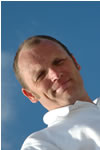
Pragmatic Development in .NET
Patterns and Best Practices in .NET
23 March 2005 (14-21)
Location: Sofitel Diegem (Diegem near Brussels (Belgium))
Presented in English by
Price: 480 EUR (excl. 21% VAT)
23 March 2005 (14-21)
Location: Sofitel Diegem (Diegem near Brussels (Belgium))
Presented in English by
Price: 480 EUR (excl. 21% VAT)

This event is history, please check out the List of Upcoming Seminars, or send us an email
Check out our related in-house workshops:
- Google BigQuery in Practice (INHOUSE WORKSHOP - On Request)